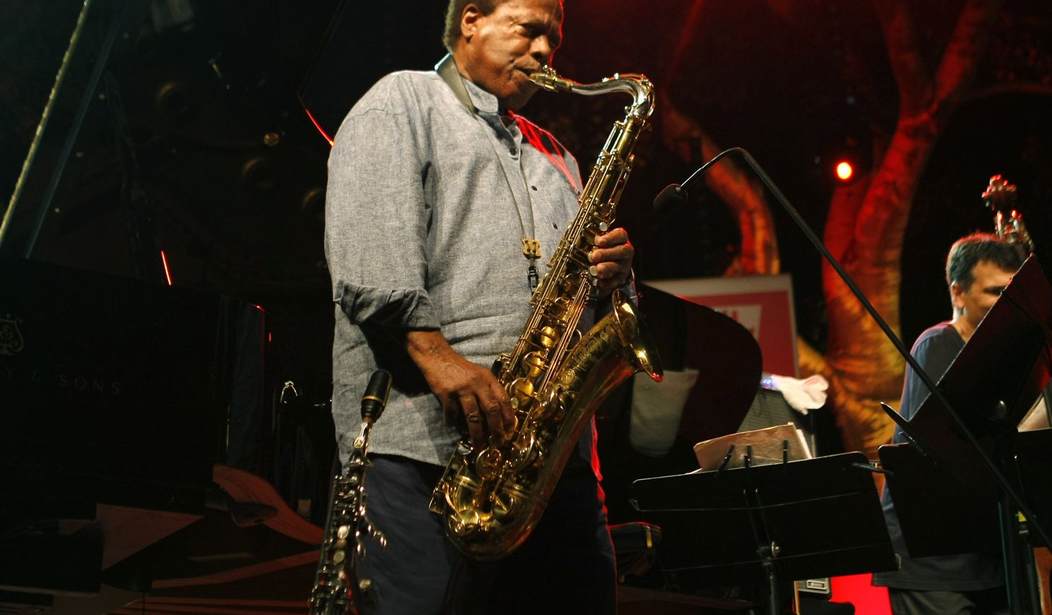The awesomely talented jazz saxophonist Wayne Shorter died on Thursday at age 89. Shorter’s long and illustrious career began in the 1950s; in the course of it, he made unforgettable music that is likely to live on long after him. When jazz was at its apogee as a centerpiece of the confident and forward-looking America of the post-World War II period and its aftermath, Shorter was a remarkable innovator, an imaginative and daring composer and improviser who never lost his deep melodic sense, even when exploring the outer reaches of what music could embody and express. Shorter’s passing is a signpost of a little-noted fact: a great era of American culture has ended.
The titans are passing from the scene. Sonny Rollins, the saxophone colossus, is still with us at age 92. So is another great tenor man, Archie Shepp, who is 85. Pharoah Sanders, another formidable tenor saxophonist, died last September. Miles Davis and John Coltrane are long gone, as are Charles Mingus, Thelonious Monk, Eric Dolphy, and so many others. The generation of musicians that gave us such rich, exhilarating, and uniquely American music is for the most part now available to us only on their recordings, and we can be grateful to have those.
Wayne Shorter was at the center of the golden age of jazz (or one of the periods that can deservedly be called that) and played with a veritable Who’s Who of the magnificent musicians of the period. When he was in his twenties, he was a key member of Art Blakey’s Jazz Messengers and made a number of classic recordings with the star-crossed trumpeter Lee Morgan and others. Then he moved on to Miles Davis’ storied quintet of the mid-and-late-’60s, where, along with pianist Herbie Hancock and drummer Tony Williams, he challenged and spurred Davis to new heights.
All that would have been enough for the entire career of an ordinary man, but Wayne Shorter was no ordinary man. In the ’70s, with the market for acoustic jazz having dried up, Shorter teamed up with keyboardist Joe Zawinul and the brilliant, doomed bassist Jaco Pastorius to form Weather Report, one of the premier jazz-rock fusion bands of the period. After that, he continued to make challenging and inspiring music.
Back in college, when I learned about the ancient Greeks (yeah, colleges were different then), I remember being surprised that so many of them were contemporaries, including the philosophers Plato and Aristotle, the historian and military leader Xenophon, and the comic playwright Aristophanes. What we think of as the cultural and literary legacy of ancient Greece was largely (although certainly not completely) the work of people of just a few generations in one city, Athens. No one saw it coming at the time, but within a few decades these thriving philosophical and literary traditions largely went dry. It may be that these great thinkers and writers were all spurred to greater heights by the presence of, and even conversation with, the others. But as they died off, so did the community they had made.
I suspect that as it recedes farther away from us in historical memory, mid-to-late-twentieth-century America will come to be regarded as a similar cultural oasis. In music, the jazz musicians who were born in the first few decades of the twentieth century, including Wayne Shorter, forged a musical style and left behind a musical legacy that is unparalleled and certainly unsurpassed in the annals of what is known as popular music. Like the ancient Athenians, most of these musical giants knew each other personally and were challenged by one another.
Shorter never recorded with John Coltrane, but they were friends and practiced together. The song “Up ‘Gainst the Wall” on the 1963 Impressions album is said to be a wry reference to how Coltrane and Shorter, during their practice sessions, would try to back each up against the wall with the sheer power of their playing. (Miles Davis, in fact, hired Shorter, whose style was similar to but also strikingly distinct from Coltrane’s, after several unsuccessful attempts to find a suitable replacement for Coltrane himself, who had left his group in 1960.) Iron sharpens iron, as the scripture says, and when one has a healthy culture, it improves everyone who is influenced by it.
Related: 5 Exhilarating Jazz Improvisations to Unshackle Your Spirit
Those days have passed. Great art, great music, and great literature are hard to find in America today, and as the Communists would say, that is no accident, comrade. Human beings are an imitative group. When one is in daily contact with great musicians, one may become one also. When one is in daily contact with a bunch of narcissistic, entitled whiners, there will just be more narcissistic, entitled whining. America may produce great artists someday once again, but not now.
As for Wayne Shorter and his colleagues, at least we have the recordings. May this superlative and near-peerless artist rest in peace.










Join the conversation as a VIP Member